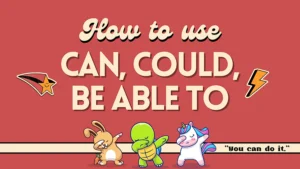CAN / COULD / BE ABLE TO: Uses, Structures, and Examples

Recommended level: low intermediate
Quick reference
-
Can is used for present ability and possibility (“I can dance.” / “I’m sorry, but I can’t help you.”)
-
Can is informally used for offers and requests (“Can I help you?” / “Can I make a suggestion?”)
-
Could is used for past ability and possibility (“We couldn’t finish the project on time.” / “She could read when she was three years old.”)
-
Could is neutrally used for offers and requests (“Could you open the door for me, please?”)
-
Be able to is used for present, past, and future ability and possibility (“Are you able to swim?” / “Were you able to swim?” / “Will you be able to swim?”)
-
Be able to is also used to discuss the success or failure of an action (“We weren’t able to find the book you wanted.”)
-
Be able to can be used with other verbs, including modals (“She should be able to attend the conference.” / “I want to be able to play the flute.”)
We use can, could, and be able to to talk about ability and possibility.
Can is used to talk about present–or general–abilities and possibilities. You can use it to talk about abilities, skills, or talents, and you can use it to talk about what is possible to do. For example:
“Serge can play the piano.” (This means he has the ability to do this. It is one of his talents or skills.)
“I can call you later.” (This means I have the ability to do this. This is possible and not a problem for me.)
“My mom can sing very well.” (This means my mom is a good singer.)
“We can park in front of the school.” (This means it is possible for us to park in front of the school. We have the ability to do this, and we will not receive a parking ticket from the police for doing this.)
The negative of can is can’t or cannot. Can’t is more common than cannot in spoken English, but both can be used. For example:
“I can’t do this.” (I do not have the ability to do this. It is not possible for me.)
“He cannot ride a bike.” (He does not know how to ride a bike. This is not one of his skills.)
“You can’t enter the club without ID.” (It is not possible to enter the club without ID. You will not be able to enter the club without ID if you try to do this.)
“Barbara is sick and can’t go to work today.” (Barbara does not have the ability to go to work today. It is not possible for her because she is sick.)
Can’t and cannot are also used in some exaggerated idiomatic sentences. For example:
“I can’t believe this.” (You can say this if an event or news story shocks you, or if something is difficult for you to believe.)
“We can’t wait to see you.” (This means “We are very excited to see you, and we want to see you soon.”)
You can also use can to make offers and requests. Can is considered informal when you use it in this way. Look at the examples:
“Can I help you with something?” (I am asking if it is possible for me to help you with something. I am offering to help you.)
“Can I go home? I don’t feel good.” (I am asking if it is possible for me to go home. I am requesting to go home.)
“Can we finish early today?” (I am asking if it is possible for us to finish early. I am requesting to finish early.)
“Can I get you a coffee?” (I am asking if it is possible for me to get you a coffee. I am offering to get you one.)
As you can see, you can use can to ask for things or to offer to do something.
Can Structures:
Affirmative: Subject + can + bare infinitive (“She can sing.”)
Negative: Subject + can’t/cannot + bare infinitive (“I can’t finish my homework today.”)
Yes/No Question: Can/Can’t + subject + bare infinitive (“Can you help me?”)
Wh- Question: Wh- + can/can’t + subject + bare infinitive (“Why can’t you attend the meeting?”)
Practice: Complete the request:
“Can I…?”
Example answers: “Can I have a cookie?” “Can I sit in the front seat?” (Context: the front seat of a car)
Could is the past of can, and it can do everything that can can do. It has several other more advanced functions in English too, but to stay focused, we will not address those uses here.
Could is used to talk about past abilities and possibilities. You use it to talk about what abilities, skills, or talents you had or developed in the past, and what was possible for you to do in the past. For example:
“I could read when I was three years old.” (This means I had the ability to read when I was three years old.)
“She could dance really well.” (This means she had a talent for dancing. She had the ability to dance well.)
“Could you go outside by yourself when you were a kid?” (This is asking if it was possible for you to go outside alone when you were a kid. Did your parents give you the ability to do this?)
“At my old job, we could wear headphones and listen to music while we worked.” (This means it was possible for employees to wear headphones and listen to music.)
“I couldn’t open the door, so I went into the house through the window.” (This means I did not have the ability to open the door. I tried to open it by force, but it did not open for me.)
The negative of could is could not or couldn’t, as you just saw above. Couldn’t is more common in spoken English. If you couldn’t do something in the past, it was not possible and/or you did not have the ability to do it. Note the examples:
“I couldn’t read until I was nine years old.” (I did not have the ability to read until I was nine years old.)
“He couldn’t swim well when he was a kid.” (He did not have the physical ability to swim well when he was a child. Or maybe he never learned how to swim well.)
“We couldn’t afford to buy a house ten years ago.” (It was not possible for us to buy a house ten years ago. We did not have the money for it, so we did not have the ability to buy it.)
“She couldn’t work for six months after her accident.” (It was not possible for her to work. She did not have the ability to do it because of her accident.)
Just like can, you can also use could to make offers and requests. Could is a more neutral word in these cases. Note the examples:
“Could you hold the door for me, please?” (I am asking you to hold the door for me.)
“Could I offer you a ride to the train station?” (You are offering to drive someone to the train station.)
“Could you move over a little bit, please?” (I am asking you to move to the side a little bit. Perhaps I want to sit beside you, or you are blocking my view of something.)
“Could I have another chance?” (I am asking for another opportunity to do something.)
Remember, could is a neutral word in these situations, while can is slightly more informal. Also, could has a present meaning in all of these examples. It is perfectly normal to use it in present contexts when you are asking for something or offering something. All of the examples above refer to the present, not the past.
Could Structures:
Affirmative: Subject + could + bare infinitive (“He could sing the alphabet.”)
Negative: Subject + couldn’t/could not + bare infinitive (“The car couldn’t move.”)
Yes/No Question: Could/Could + subject + bare infinitive (“Could you do what you wanted?”)
Wh- Question: Wh- + could/couldn’t + subject + bare infinitive (“What could you see?”)
Practice: What could you do by the time you were 10 years old? What couldn’t you do?
Start: “By the time I was 10 years old, I could…However, I couldn’t…”


Создать бесплатную учетную запись
Your point of view caught my eye and was very interesting. Thanks. I have a question for you.
Bouarfa Mohamed
Yes